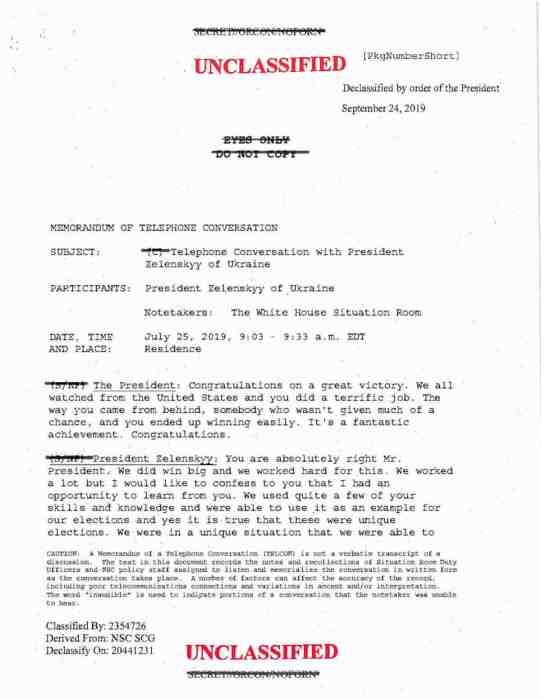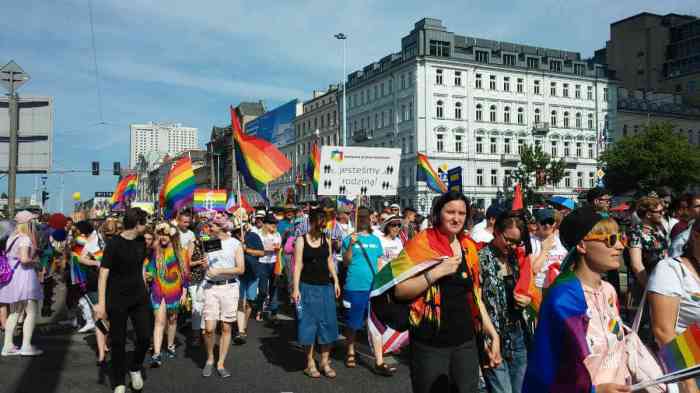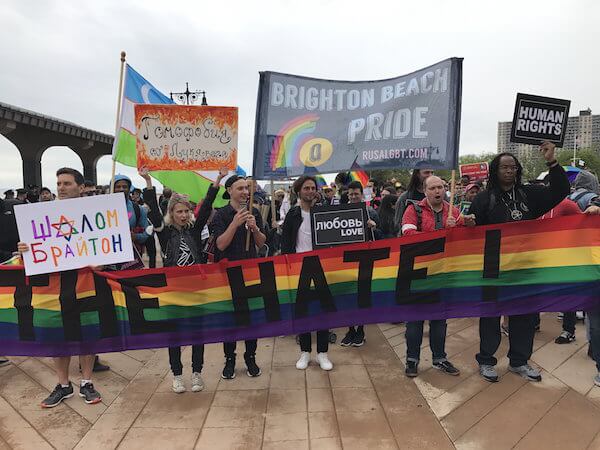Boxers NYC bartenders dump Stolichnaya Vodka at a July 31 protest at Manhattan's Russian consulate as owner Bob Fluet looks on. | GAY CITY NEWS
BY ANDY HUMM | With the many nations that are governed by anti-gay laws, why has the Russian crackdown on open gay life sparked worldwide outrage? Basically because that country is so big and powerful, a forum at the LGBT Community Center on August 26 concluded — with a vote on the United Nations Security Council and the ability to set a terrible example for other countries contemplating similar scapegoating of their LGBT populations. And with Russia hosting the Winter Olympics in Sochi next February, the story has arguably become the biggest international LGBT news story ever.
The forum attracted attention not just because of the line-up of human rights and Russia experts on the panel, but because it was moderated by Tony Juliano, owner of the gay XES Lounge, which has an exclusive relationship with Stoli Vodka, currently being dumped into the streets in protests around the world to draw attention to the crisis for people of “non-traditional sexualities,” whom the Russian President Vladimir Putin and his Duma have consigned to the closet.
Forum looks at crisis for Russian gays in an anti-gay world, but opposes boycotts
Juliano publicly opposes the boycott of Stoli, writing on Facebook that the company is “a friend and ally of the LGBT community,” describing it as a “partner” of XES Lounge. While many other gay bars across the country and globally are refusing to sell any Russian vodka, Juliano is donating a dollar for every Stoli drink sold to Amnesty International, one of the groups represented on the panel and an outspoken opponent of the new Russian law.
While Amnesty may be taking Juliano’s donations, the Center, which hosted the event gratis, said that it doesn’t receive money from Stoli nor do the other groups represented on the panel — the International Gay and Lesbian Human Rights Commission (IGLHRC), Human Rights Watch (HRW), and the NYU Jordan Center for the Advanced Study of Russia. IGLHRC and HRW oppose boycotts of Russian products and the Olympics in the fight against the Russian law.
Alan Klein of Queer Nation, which has taken the lead on protest efforts in New York, did not attend the forum but wrote on Facebook, “The ‘boycott’ has already been hugely successful. Although we are unlikely to hurt Stoli financially in the short-term, they’re certainly afraid of the long-term effect of a black eye from gay activists — so much so that they are more or less paying Queerty and other LGBT sites to print their press releases, which are full of disinformation. That makes us extremely powerful.”
Klein also wrote that “the tactic has driven discourse around Russia’s oppression of the LGBT community to another level entirely.”
While Queer Nation has brought hundreds of people — including more than 60 Russians — to the Center to take action to protest the Russian laws, this informational forum was not built around planning any action. In a lengthy Q&A session, however, panelists said what they believed would make a difference.
Tanya Cooper of HRW said her group is “putting pressure on the IOC [International Olympic Committee]” to make it clear that “under the Olympic charter, discrimination is forbidden and the host country is obliged to respect that,” both in terms of “its own citizens and foreigners.” But Russia is making no such concessions and the IOC, in an August 30 letter to New York Council Speaker Christine Quinn, wrote that the “IOC is limited to the scope of the Games. For instance, the IOC cannot influence national legislation and has to respect the law of any host country.”
“Russia has to be held accountable,” said Cooper, “and we’re reaching out to McDonald’s and other corporate sponsors [of the Games] to put pressure on the IOC.”
Vodka purveyor leads vodka debate
Roberta Sklar, communications director at IGLHRC, said, “The Russian LGBT Network says speak up, not walk out. Raise your voices… There is a message going out [from the Russian government] that’s extremely dangerous — that it is okay to have laws against gay people. That’s something to raise hell about.
But while Sklar repeatedly cited LGBT activists in Russia opposed to boycotts, almost 40 such activists have signed on to a Queer Nation “statement on the boycott of Russian goods and services” endorsing the tactic saying, “We appreciate any and all attempts to let Russian authorities know that homophobic and inhumane laws will not go unnoticed and that Vladimir Putin’s regime will not get away with anti-gay violence.
Eliot Borenstein of the NYU Jordan Center, a professor of Russian and Slavic Studies, said, “Boycotts can play into the current regressive agenda” that has Russians saying, “The West is against us! Our values are not being respected!” He said, “Most Russians would be mystified by our concerns about LGBT people. I don’t have a solution, but it is important to keep that in mind.”
Borenstein wrote a blog post for the Jordan Center on “Sending Our Gay Students to Russia” that concluded, “We should make sure our students have as much information as possible, and let them know that visibility can bring vulnerability (especially to gay men, who are the primary target of a campaign that is so clearly connected to anxieties about ‘manliness’).”
Vlachaslau Bortnik of Amnesty, a native of Belarus, painted a grim picture of what the LGBT rights movement faces there and in Russia, citing “Belarus’ first and only president [Alexander Lukashenko] who said, ‘Homosexuality was brought from the West. It is not something that can be tolerated in Belarus.’”
Bortnik recalled being “very scared” when he tried to participate in Moscow Pride, which is forbidden by authorities. “Hundreds were attacked for looking like gay people,” he said.
Borenstein said Russia “has a long tradition of homophobia,” citing the Soviet era when gay men were imprisoned and lesbians were treated at psychiatric facilities. The laws against sodomy were repealed in 1993 and “it was a better time,” but the return of Putin to power has seen homosexuality as something “to rally against.” He calls Putin’s crew “an authoritarian regime without an ideology that seeks power for its own sake and has picked an internal group that is an external threat” in their formulation.
Cooper sees the new laws as an extension of all the new Putin laws “to restrict movements” and “target human rights workers and the opposition.”
“It’s not okay to say you’re gay” in Russia, Cooper said. “That’s a huge violation of freedom.”
Sklar cited a Russian lesbian activist who told her, “Please don’t silo LGBT people. Look at us as a larger community of human rights defenders.”
After the panel, Juliano said, “I talked about the 76 countries that ban gay sex and asked why we’re focusing on Russia, which does not. They answered that question. It’s the power and influence that Russia has around the world.”
Andrew Miller of Queer Nation, who attended the forum, said, “I was disappointed the panelists weren’t as informed as they might have been. There was information about what is going on in Russia from the perspective of gay and lesbian Russians who live there that didn’t get covered and that we were able to let people know about at the Queer Nation town meetings.”
The debate about what is happening inside Russia for LGBT people and how to help will continue. There is no debate that the situation is dire and that action is required now.
An International Day of Solidarity around the crisis is scheduled for September 8, with a rally planned in Union Square from 3 to 6 p.m.




































